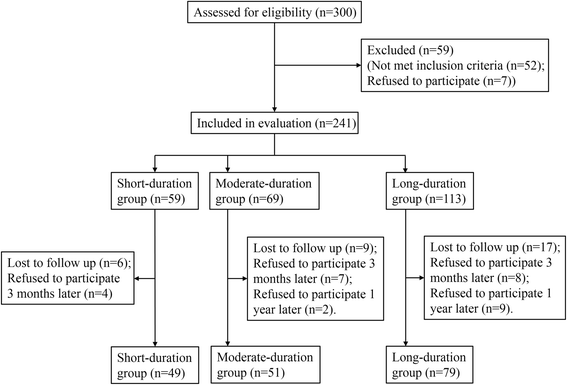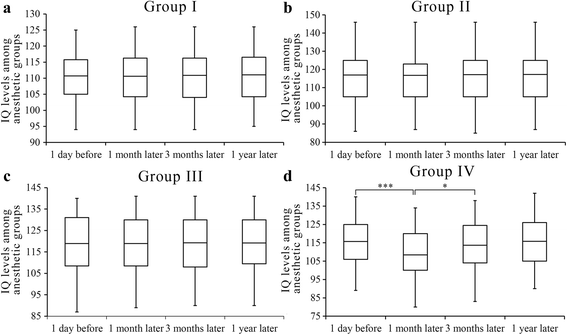Long-duration general anesthesia influences the intelligence of school age children
- PMID: 29258430
- PMCID: PMC5735791
- DOI: 10.1186/s12871-017-0462-8
Long-duration general anesthesia influences the intelligence of school age children
Abstract
Background: General anesthesia has been linked to impaired brain development in immature animals and young children. In this study the influence of orthopedic surgery under general anesthesia on the intelligence of school age children has been evaluated.
Methods: A total of 209 subjects aged 6-12 years were recruited and allocated into 4 groups according to the duration of general anesthesia, including a control group (n = 30), short (< 1 h, n = 49), moderate- (1-3 h, n = 51) and long-duration groups (> 3 h, n = 79), respectively. The intelligence quotient (IQ) of the subjects was measured by the Raven's Standard Progressive Matrices (RSPM) before and after orthopedic surgery under general anesthesia of various durations (vide supra).
Results: The IQ score decreased significantly in the long-duration group at 1 month post-operation compared with the pre-operation score (P < 0.001), and IQ did not recover completely at 3 months postoperatively (P < 0.05), but had recovered when measured at the 1-year follow-up. Moreover, this study showed that the development of children's intelligence was affected by the exposure time to anesthetics at a younger age (OR = 5.26, 95% CI:2.70-8.41, P < 0.001), having a mother with a low education level (OR = 2.71, 95% CI:1.24-6.14, P = 0.014) and premature birth (OR = 2.76, 95% CI:1.34-5.46, P = 0.005).
Conclusions: More than 3 h general anesthesia influenced the IQ of school age children for up to 3 months after orthopedic surgery. Beside extended exposure time to anesthetics additional factors for post-operative IQ reduction were younger children age, mothers with low educational levels and premature birth.
Trial registration: Chinese Clinical Trial Registry with registration number ChiCTR-OOC-17013497 retrospectively registered on 11/23/2017.
Keywords: Children; Cognition; General anesthesia; Intelligence; Orthopedic surgery.
Conflict of interest statement
Ethics approval and consent to participate
The Ethical Committee of Shanghai Xinhua Hospital approved the study and written informed consents were obtained from all participants’ guardians.
Reference number for the ethics approval is XHEC-D-2009-018.
Consent for publication
Not applicable.
Competing interests
The authors declare that they have no competing interests.
Publisher’s Note
Springer Nature remains neutral with regard to jurisdictional claims in published maps and institutional affiliations.
Figures


References
-
- Sanchez V, Feinstein SD, Lunardi N, Joksovic PM, Boscolo A, Todorovic SM, et al. General anesthesia causes long-term impairment of mitochondrial morphogenesis and synaptic transmission in developing rat brain. Anesthesiology. 2011;115(5):992–1002. doi: 10.1097/ALN.0b013e3182303a63. - DOI - PMC - PubMed
-
- Tan H, Ren RR, Xiong ZQ, Wang YW. Effects of ketamine and midazolam on morphology of dendritic spines in hippocampal CA1 region of neonatal mice. Chin Med J. 2009;122(4):455–459. - PubMed
MeSH terms
Grants and funding
LinkOut - more resources
Full Text Sources
Other Literature Sources
Medical

